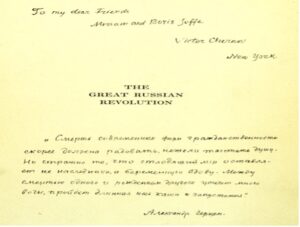Events following Nicolas’ abdication were complex, with provisional governments, including one led by Alexander Kerensky, deposed by Vladimir Lenin and the Communists in the revolution of October 1917.41 (see Figures 1A–1D).

Figure 1D. Inscription from The Great Russian Revolution (1936), given to Miriam and Boris Joffe (in-laws of one of the authors, Dr. Panush) by Viktor Chernov.41 The inscription translates to: “The death of modern forms of civil society should, perhaps, be something to celebrate rather than to burden our souls. But what is frightening is that the old world leaves behind not an heir, but a pregnant widow. From the death of the former to the birth of the new quite some time will pass— fraught with chaos and desolation.” (Attributed to Alexander Herzen, 1812–1870, a Russian socialist ideologue.) (See also Figure 1D PT2 below.)
What if … Tsarevich Alexei did not have a near-fatal episode of hemophilia (possibly with attendant arthropathy) at the royal hunting lodge, leading the tsarina to involve Rasputin in her confounding governance of the country while Nicolas was at the front (“if there had been no Rasputin, there would have been no Lenin” [Alexander Kerensky])? How different might 20th century history have been)?
Possible Giant Cell Arteritis, Hitler & the Rise & Fall of the Third Reich
Adolph Hitler was known to suffer from several medical conditions, possibly including giant cell arteritis (GCA).42 As a child, he suffered pulmonary illness, and he was exposed to toxic substances, including mustard gas during World War I.43 At age 47 he was diagnosed with eczema and dyspepsia.42
In 1941, Hitler experienced fatigue, malaise, dizziness, abdominal pain, left temple pain and tenderness, tinnitus, had a systolic blood pressure of 170 mmHg and “coronary insufficiency,” diagnosed as vascular spasm and colitis.42 On July 22, 1942, he developed severe right-sided headaches and unilateral painless vision changes on the right, considered coronary sclerosis and vascular spasm. He was treated with intravenous glucose, cold compresses and leeches.42,43 From 1942 to 1944, Hitler had more than 13 similar attacks.
In 1943, he had a “swollen” temporal artery, recurrent abdominal pain, distension and jaundice, diagnosed as gastritis. Resting tremor and gait abnormalities were diagnosed as Parkinson’s disease.42 In late 1944, Hitler had weight loss, fever and an erythrocyte sedimentation rate of 36 mm/hr and 70 mm/2 hr.42 March 1944 brought worsening vision (20/80 acuity) and cloudiness of the vitreous body.43


